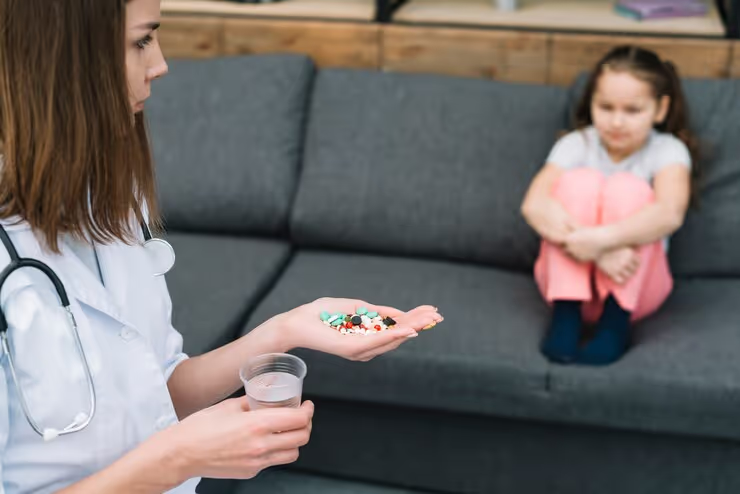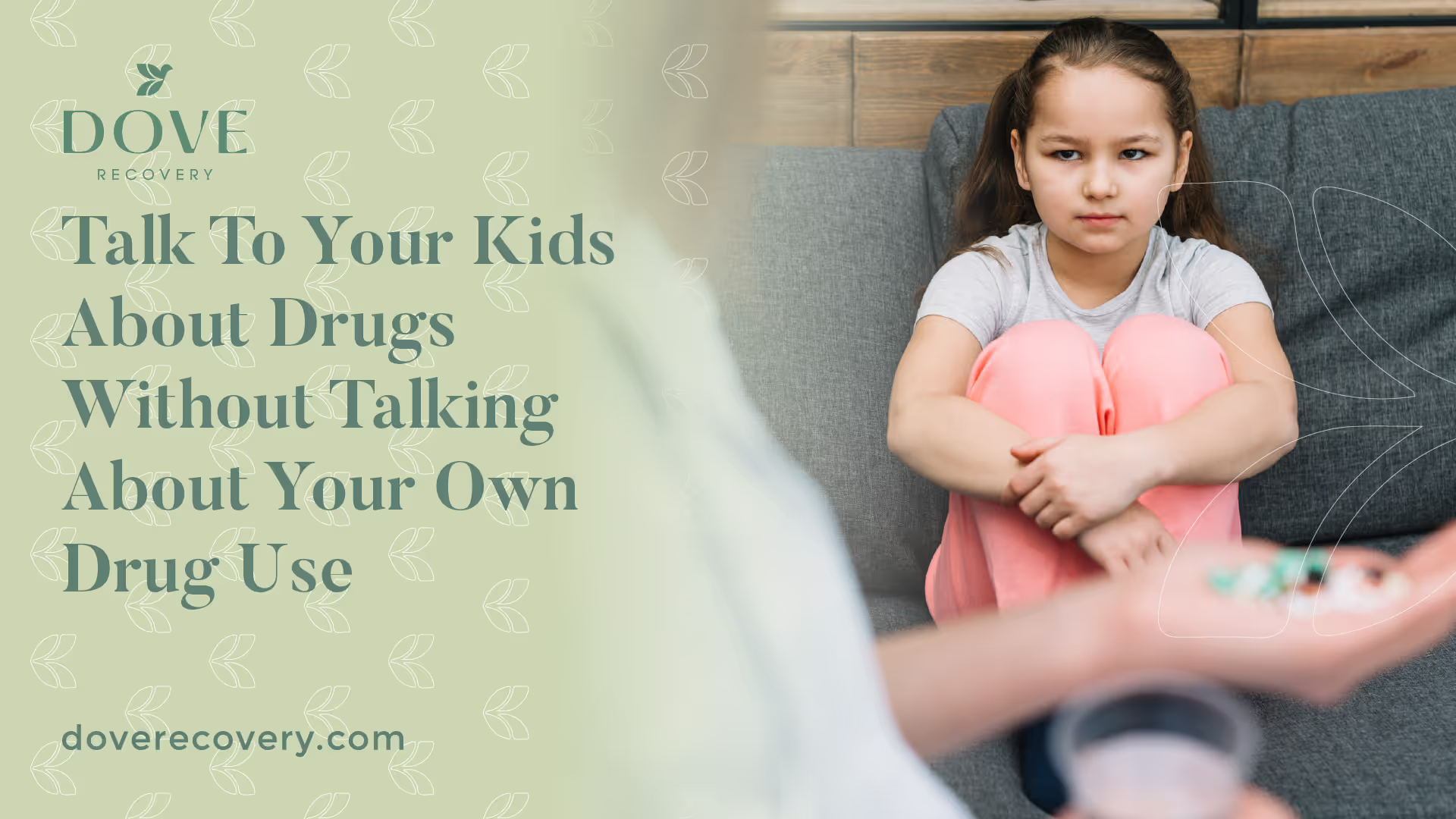Talk To Your Kids About Drugs Without Talking About Your Own Drug Use

Importance of Parental Communication
Parental communication plays a pivotal role in helping children understand the potential dangers of drug use. From initiating conversations to the impact of early discussions, this section explores the significance of parental communication in discussing drugs with kids without sharing personal experiences.
Initiating Conversations
The first step in discussing drugs with children is to initiate the conversation. A video on the SAMHSA website encourages families to talk directly with their loved ones about concerns over substance use, providing guidance on initiating these conversations. Encouraging an open family environment where kids can talk about their feelings, achievements are praised, and self-esteem is boosted fosters an atmosphere where kids feel comfortable bringing forward their questions and concerns about drugs.

It's important to remember that not talking to children about alcohol and other drugs can still convey a message. Kids might not have all the facts on the risks associated with drug use, so if parents don't address these topics, their children might not perceive the harm in trying these substances. Engaging in conversations empowers parents to establish clear expectations regarding alcohol and drug use.
Impact of Early Discussions
Early and open discussions about alcohol and drugs with children make them more likely to adhere to parent-imposed rules and advice regarding substance use, thus helping protect them from high-risk behaviors associated with drug use.
Parents can help protect kids against drug use by giving them the facts before they're in a risky situation. This can make them less likely to experiment with drugs or to rely on friends for answers.
Children's decisions to experiment with alcohol and other drugs are significantly influenced by the relationship they have with their parents. By fostering supportive and nurturing environments and discussing the risks associated with drug use, parents can guide their children towards making better choices.
In essence, parental communication about the risks of underage drinking and substance use helps set clear expectations and boundaries, influencing the children's decisions in this regard [2]. Even though it may not always seem like it, children really hear their parents’ concerns, which is why it’s important that parents discuss the risks of using alcohol and other drugs.
Understanding Substance Use
To effectively educate children about substance use, it's crucial to understand the prevalence and risks associated with such behaviors among youth. This knowledge will help guide conversations and provide context to the dangers of drug use, without necessitating the sharing of personal experiences.
Prevalence among Youth
The prevalence of substance use among youth is a growing concern. According to SAMHSA, children as young as nine years old start viewing alcohol in a more positive light. Alarmingly, approximately 3,300 kids as young as 12 try marijuana each day. Furthermore, about five in 10 kids as young as 12 obtain prescription pain relievers for nonmedical purposes.
The usage escalates as children age. Around 10 percent of 12-year-olds say they have tried alcohol, but by age 15, that number jumps to 50 percent. By the time they are high school seniors, almost 70 percent of students will have tried alcohol, half will have taken an illegal drug, and more than 20 percent will have used a prescription drug for nonmedical purposes.
Risks and Statistics
The risks associated with substance use in youth are numerous and serious. This includes health problems, academic issues, increased risk of accidents, and potential legal consequences. The earlier parents start talking to their children about alcohol and other drugs, the better the chances they have of influencing their decisions about substance use. This reinforces the importance of understanding the facts and figures about substance use among youth, forming a vital part of the strategy to talk to your kids about drugs without talking about your own drug use.
Parental Influence on Decision Making
Parents play a pivotal role in influencing their children's decision-making processes, particularly when it comes to substance use. By actively engaging in discussions about the risks and implications of drug use, parents can help set clear expectations and promote positive behaviors.
Setting Clear Expectations
Parents' conversations about the risks of underage drinking and substance use significantly influence their children's decisions in this regard. These dialogues allow parents to set clear expectations and boundaries, ultimately guiding children towards healthier choices [2].
However, not addressing these topics can have adverse effects. Silence on the subject of alcohol and drug use can convey a message to children, potentially leading them to underestimate the risks associated with substance use due to lack of parental guidance [2].
Encouraging Positive Behaviors
In addition to setting clear expectations, parents can encourage positive behaviors to protect children from substance use. Providing factual information about drugs before children find themselves in risky situations can arm them with knowledge, making them less likely to experiment with drugs or rely on friends for answers.
Furthermore, fostering an environment of positive interactions and self-esteem can deter children from drug use. For instance, encouraging children to engage in hobbies, sports, and clubs that interest them can lead to healthier social interactions and less exposure to environments conducive to drug use.
In conclusion, parents can significantly influence their children's decisions regarding substance use by actively discussing the topic, setting clear expectations, and promoting positive behaviors. These strategies can ensure that children are well-equipped to make informed decisions when faced with opportunities to use drugs.
Effective Communication Strategies
To initiate a successful conversation about drugs, it's crucial to employ effective communication strategies. These strategies can ensure that the information is delivered in a manner that children can understand and apply in real-life situations.
Age-Appropriate Discussions
When discussing drugs with kids, it's essential to keep the conversation age-appropriate. For young children, parents can use "teachable moments" like seeing smoking in movies or on TV to introduce broader discussions about drugs and their harmful effects. It's important to maintain a calm tone and use terms that young children can understand, explaining that drugs can cause harmful effects in the body [1].
As children grow older, parents can start asking what they've heard about drugs in a nonjudgmental manner. This approach encourages honest responses and keeps the dialogue open as kids transition into their teenage years. For teenagers, parents need to engage in discussions about the consequences of substance use, including the dangers of driving under the influence and the legal implications that may arise.
Creating Open Family Environment
Creating an open family environment is another crucial strategy in discussing drugs. This environment can promote open communication, fostering a space where children feel comfortable discussing their feelings and concerns about drugs. It can also serve as a platform for praising achievements and boosting self-esteem, which can further deter children from experimenting with drugs [1].
In this environment, parents can provide the necessary information about the dangers of drugs and teach kids how to say no when faced with potentially harmful substances. It's also a space where parents can model behavior, as their views on substances like alcohol, tobacco, and drugs can significantly influence how their children perceive these substances [1].
By employing these communication strategies, parents can effectively discuss drugs with their kids without sharing personal experiences. The key is to provide factual information, encourage open communication, and emphasize the harmful effects of drugs.
Addressing Specific Concerns
When discussing the subject of drugs with children, it's crucial to address specific concerns. Some of these concerns may include the hazards of driving under the influence and the influence of peers and social activities on substance use.
Driving Under the Influence
One of the critical topics to discuss with teenagers is the dangers of driving under the influence of drugs or alcohol. Parents should have these conversations not only to understand their teen's thoughts and feelings but also to address the potential legal issues, jail time, fines, and the potential for injuries or fatalities that can result from such behavior. The severity of these consequences should be emphasized to ensure the teen understands the risks involved.
Peer Influence and Social Activities
Teenagers are likely to have peers who use alcohol or drugs, making it essential for parents to engage in conversations about the consequences of substance use. This includes discussing the dangers of driving under the influence and the influence of social activities on drug and alcohol use. Establishing clear expectations through ongoing discussions and potentially creating written or verbal contracts on rules can help teens understand the risks associated with drugs and alcohol [1].
Silence on the topic of alcohol and drug use can convey a message to children, potentially leading them to underestimate the risks associated with substance use due to lack of parental guidance. Parents' conversations with their children about the risks of underage drinking and substance use help set clear expectations and boundaries, influencing the children's decisions in this regard. When parents talk with their children early and often about alcohol and other drugs, they can protect their children from many of the high-risk behaviors associated with using these drugs.
Additionally, parents should encourage an open family environment where kids can talk about their feelings, achievements are praised, and self-esteem is boosted. This atmosphere encourages kids to come forward with their questions and concerns about drugs.
By addressing these specific concerns, parents can help their children make informed decisions about drug use and understand the severe implications of these actions. It's crucial for parents to maintain open lines of communication, ensuring their children feel comfortable discussing these challenging topics.
Providing Guidance and Support
When it comes to guiding and supporting children in the context of addressing drug use, two key strategies come into focus: role modeling behavior and teaching kids to make informed choices. Both these approaches play a crucial role in creating a safe and supportive environment for children to navigate these challenging topics.
Role Modeling Behavior
As a parent, one of the most influential roles you can play is being a positive role model. Children often emulate the behaviors and attitudes of their parents, meaning your views on drugs and alcohol can have a profound impact on how your child perceives these substances.
According to KidsHealth, it's critical to demonstrate a responsible and mindful attitude towards substances. This could entail showing your children how to enjoy social events without the need for alcohol or expressing disapproval towards irresponsible behaviors such as drunk driving.
Creating an open family environment is also essential. This encourages children to come forward with any questions or concerns they may have about drugs, fostering a space where they can feel safe and supported in their curiosity and concerns.
Teaching Kids to Make Informed Choices
Equipping your children with the knowledge they need to make informed decisions about drugs is another crucial step. KidsHealth suggests that providing kids with facts about the dangers of drugs and teaching them how to say no if offered something dangerous can make them less likely to experiment with drugs.
This approach should be age-appropriate. For example, with younger children, it's important to keep the tone calm and use terms they can understand. As children grow older, initiating conversations about drugs in a nonjudgmental manner can encourage honest responses, keeping the dialogue open as they grow older.
For teenagers, discussions should also address the consequences of substance use, including the dangers of driving under the influence. Establishing clear expectations through ongoing discussions and potentially creating written or verbal contracts on rules can help teens understand the risks associated with drugs and alcohol.
Ultimately, teaching your children to make informed choices about drugs, combined with role modeling positive behaviors, can create a supportive environment where they feel well-equipped to navigate the challenges that may arise in relation to drug use.
References
[1]: https://kidshealth.org/en/parents/talk-about-drugs.html
[2]: https://www.samhsa.gov/talk-they-hear-you/parent-resources/why-you-should-talk-your-child
[3]: https://www.positivediscipline.com/articles/communicate-kids-about-drugs
[4]: https://www.mayoclinic.org/healthy-lifestyle/tween-and-teen-health/in-depth/teen-drug-abuse/art-20045921
[5]: https://positivechoices.org.au/parents/how-parents-can-protect-against-drug-use
